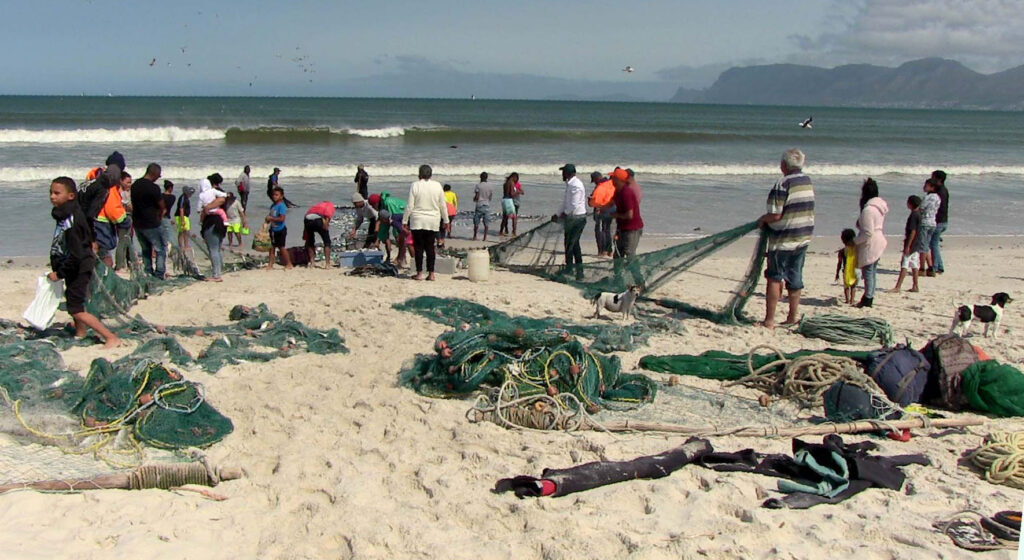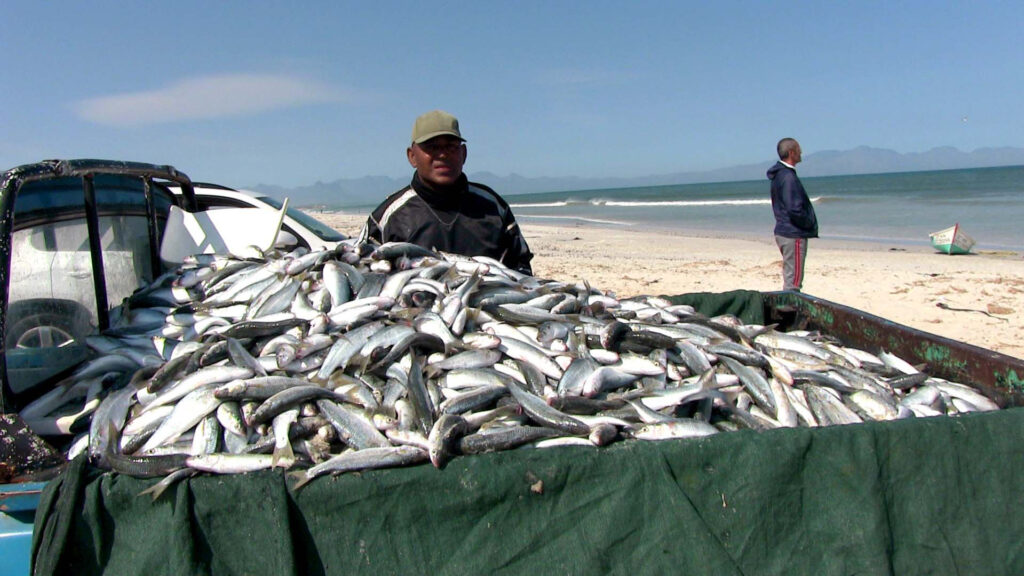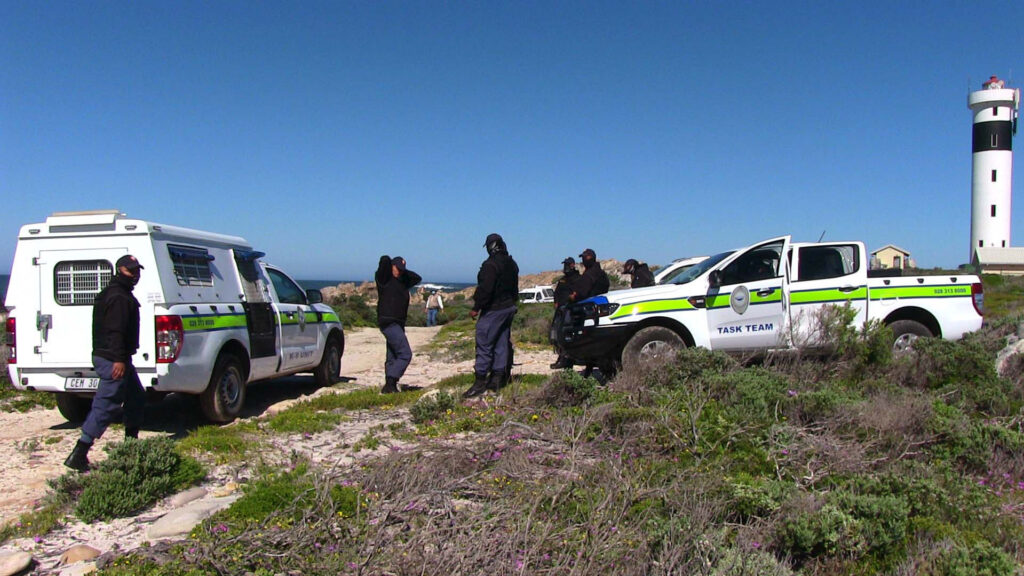Squeezed: Chris Arendse fixes his fishing net at his home in Strandfontein Pavilion in Cape Town. Small-scale fishers say the odds are stacked against them. Photos: Bongani Siziba
At Pringle Bay, a small coastal village in the Overberg region of the Western Cape, there has been no sight of boats or fishers all morning.
After toiling a cold night away in search of fish, Carmen Oquendo Pabón, a local fisherman, emerges with three peers, who while docking his boat laments in Afrikaans about the decline in fish stocks in Cape waters over the past three years.
Pabón recalls a time when he was able to catch enough fish to sell and to feed his family.
“We never returned empty-handed,” he says.
The nearby creeks and ocean foreshore areas once held an abundance of fish, crabs and prawns, according to Pabón, who was raised in the community.
Now, the fishing space is crowded and the catches are uncertain. Respecting restrictions on the size of nets or competing with big boats has become a problem, and many fishers consequently choose to fish illegally at night.
“In my 26 years in this business, the last few years have been the worst. We are trying to do whatever we can to make ends meet here,” he says.
Overexploited
According to the South African Sustainable Seafood Initiative (Sassi) there has been a dramatic increase in the amount of fish and other marine creatures extracted from the seas in recent decades. Many linefish species, the most accessible of our inshore fish stocks, are overexploited or have collapsed because of illegal fishing methods and overfishing.
Globally, many fish stocks are already fully fished or overexploited.
Thousands of people in coastal communities rely on fish for survival, as Pabón does, but the coast is in crisis. Its fish stocks are declining annually, and fishers say they have been forced into catching as much as they can.
Although no suspicious activity was seen along Pringle Bay’s rocky beach when the Mail & Guardian visited the area with the department of forestry, fisheries and environment, together with a K9 patrolling team, one of the officials insisted that there was “massive” illegal activity taking place.
“The coast is clear today, but l can bet this area is always busy with illegal poachers at work. We don’t have the manpower to cover much of this area that we have been allocated to protect. Poachers have spotters who watch our movements and pass the information to divers and fishermen. It’s a game of cat-and-mouse here,” said the official, who did not want to be named.
“These poachers are better equipped than protection officers, and have the advantage of the law unless caught in possession or in the act. The scale of the problem is immense,” the official added.
On the other side of the coast, as dawn breaks over the False Bay shore in Mitchells Plain, an eerie calm embraces the fishing harbour while residents await the return of the fishers. Traders, young and old, rush toward the vessels when they dock, intent on purchases for consumption and resale.
The crew and captains of these aged deep-sea vessels offload their catch for the attention of labourers waiting on the platform. Fish are sorted and transported to vehicles, or sometimes to an auctioneer waiting a few paces away.
Prized catches, such as yellowtail and bream, are carefully stored in big ice boxes; common fish, such as oil sardine and mackerel, are offloaded more casually.
After an hour or so, the harbour front is packed with thousands of baskets of fish.
Val Arendse (67) has been fishing these waters for years. She says that many fishers in her community have resorted to illegal fishing because of the competition they face from big, well-resourced vessels.

“These big vessels benefit from government subsidies that include access to safety and navigation gear and insurance premiums. We don’t get that. We rely on fishing as a business and source of income to feed our families. If we don’t catch as much fish we won’t survive,” says Arendse.
“We receive nothing from the government. It is indeed in the best interests of the fisher community to control harmful fishing subsidies. These subsidies are only directed at big vessels.”
She also flags the absence of a catch reporting system and markets incentivising destructive fishing practices, such as juvenile fishing, as among issues that need to be resolved as soon as possible.
Subsidies that hurt, not help
According to the 2020 State of World Fisheries and Aquaculture report, subsidies, in the form of support provided to the fishing industry to offset the costs of doing business, are a key driver of illegal fishing and overfishing. Subsidies can lead to overcapacity of fishing vessels and skewing of production costs, meaning that fishing operations continue when it would otherwise not make economic sense.
With the fishing space crowded and the catch uncertain, respecting fishing net size restrictions or bans on catching becomes a challenge. The department of forestry, fisheries and the environment started a livelihood scheme in 2013-14, but there have been several difficulties in implementation.
Speaking to the M&G at Hout Bay harbour, community leader Clarence Smith says the government “is not catering for small-scale fisheries, and this is another failure by the department”.

“We are still not recognised as indigenous beneficiaries and dependents of our own marine resources. We are still denied the rights to harvest for our own livelihoods. Why are we not not owners of our own destiny?” Smith asks.
Many coastal fishing communities do not enjoy the same level of economic development as their large-scale counterparts. Governments often see supporting fishers as a means to contribute to local development and improve food security.
According to the global dataset on subsidies to the fisheries, each year, governments spend an estimated $35-billion worldwide to support the fishing sector, but many of these subsidies are harmful to the long-term health of the sector, and can lead to overfishing and overexploitation of fishery resources.
Fisheries economists have argued that the best way forward is for the government to withdraw subsidies in a phased manner while also implementing regulations to control overfishing.
Dr Louise Gammage of the Marine and Antarctic Research Centre for Innovation and Sustainability at the University of Cape Town told the M&G that subsidies were regarded as unfavourable for small-scale fishers internationally.
“It is seen as a way of creating some favours for large industrial fishing, and it is the large-scale fishers that are causing illegal and overfishing problems. The government has to look at how to help small-scale and commercial fisheries to avoid overfishing and illegal activities on our seas.
“We have a duty to preserve both our natural and cultural heritage — the continued failure to balance environmental concerns (ecosystem health) and societal needs (including aspects of social justice), will have devastating effects on marine social-ecological systems going into the future,” Gammage said.
According to Sassi, 312-million kilograms of seafood is consumed each year in South Africa, with 50% caught locally. Sardine and hake make up 70% of consumption.
Squeezing the small
Small-scale fishers have more restrictions on quotas and zoning compared to fishing companies, and accusations are that the department has not yet allocated adequate rights to small-scale fishers since the enactment of the Marine Living Resources Act.
Small-scale fishers are prohibited from harvesting during weekends and public holidays, which they say is a significant hindrance to earning a living, along with possible adverse fishing conditions during the week.
There is also discrimination in terms of the allocation of fishing rights, according to the small-scale fishers, with the commercial fishing industry being granted eight years or more, while the small-scale sector is afforded three years.
Laws to include local fishing communities have been adopted where small fisheries were included into the fishing sector as subsistence fishers. Individuals were issued a permit of five crayfish (rock lobster) per person. This permit restricted fishers to harvesting with specified catching equipment, and also restricted areas for catches.
However, a shortage of boats, offloading facilities, transport logistics, holding facilities, processing facilities, storage facilities and marketing continue to profit market providers instead of small fishing communities.
According to the Africa Centre for Strategic Studies (ACSS), thousands of foreign fishing vessels ply African waters every year seeking to tap the continent’s rich fish stocks. Many of the vessels are believed to be illegally exploiting Africa’s fisheries.
Offences include fishing without a licence, fishing in protected areas, using banned fishing gear that is destructive to the sector, catching beyond limits, or catching protected species. Even licensed vessels regularly do not report catches as required. Those that do often underreport their actual haul.
This is a result of trade dynamics that have shifted toward high levels of exports from African fisheries and a greater reliance on imports eliminating a crucial food security safety net.
Zolile Nqayi of the department of forestry, fisheries and environment said the department has regulations to curb overfishing.
“Commercial fishers are regulated through permits and conditions.The department deploys coastal and sea patrols and inspections on land and at sea to verify right holders. Action is taken when commercial fishermen are found contravening the Marine Living Resources Act. These actions include cancelling permits, exemptions or rights,” Nqali said.

“We are addressing the threat of overfishing and illegal fishing through special operations under Operation Phakisa. This is a multidisciplinary, multi-agency initiative aimed at preventing illegal fishing and deploying anti-poaching operations,” she added.
ACSS says criminal and unethical activities emerge as a result of the structural crisis in industrial fisheries.
Its roots lie partly in the reckless use of subsidies by fishing nations. Global efforts to phase out capacity-enhancing subsidies in fisheries, including through the World Trade Organisation (WTO), have been drawn-out and ineffective, and thought to be blocked by several fishing nations, including Taiwan, South Korea, and Japan as well as the EU.
Revitalising WTO discussions on fishery subsidy reform is under negotiation. However, it is not clear that any new agreement would be stronger than what presently exists.
According to the department of forestry, fisheries and the environment, the South African fisheries sector is worth around R6-billion per annum and directly employs some 27 000 people in the commercial sector.
This story was produced with the support of Internews’ Earth Journalism Network